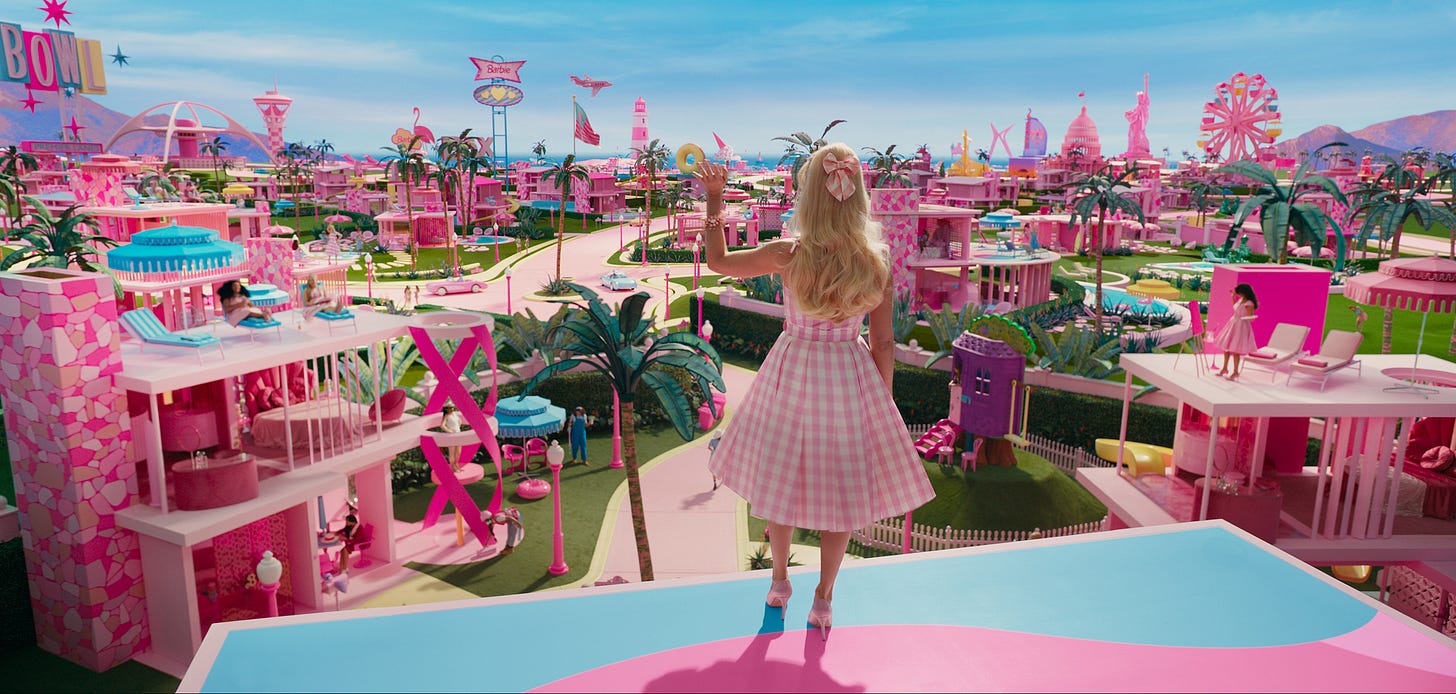The Barbie movie hit theaters last week and has quickly dominated the box office. A lot of girls come together to the theater dressing up like Barbies: wearing all pink, high-heels, and full makeup. Truly, there haven’t been female-driven blockbusters for a while, and women, especially young girls (men as well), are turning this move into a celebration of feminism.
I followed the crowd to watch Barbie, wearing a Barbie-pink shirt that my sister gave me as a birthday gift.
Starting with Barbie
Barbie means imagination.
For billions of children and pre-teens, Babie has come to mean whatever girls hope and dream life to be like. “Barbie is not just a doll, it is a canvas that young girls project adventures and stories onto, where life is a fantastic plot line filled with pink limos, dream houses, and fashion”. It is a doll that was originally invented for girls to explore being grown women.
A grown woman has so much more meaning than a mom role, just as the movie tells, we see Barbies as lawyers, doctors, teachers, and engineers; we see Barbies representing all skin-color and minorities; and of course, we have a typical stereotypical Barbie, a beautiful skinny blond girl, which is supposed to mean the “perfect” imagination.
The movie does a really great job of uncovering the reality that women are suffering from this perfection. The perpetuated unrealistic beauty standards (and a whole set of impossible standards) are being implanted so deeply in our brains that are too hard to escape from. While men (to my knowledge, at least) don’t experience the same thing.
Why Patriarchy
We live in a patriarchal society.
Throughout the world for thousands of years, the systems of oppression seem to be natural and eternal. We had ethical movements, religious movements, and political revolutions while one thing remained constant, and this is the patriarchal system and the oppression of women. Thankfully, things started to change when Feminism came along. It has been maybe the most successful social movement of the 20th century, a movement that succeeded in storytelling without violence. The Feminists are fighting for gender equality that changes the deep structure of oppression in a way that benefited not just women, but also men.
But on the dark side, men are still in charge these days. Rome can not be built in a day. It hit me really hard in the cinema when Aaron (a “nobody character”) said, “I’m a man without power. Does that make me a woman?” Being a woman is hard while the patriarchy reigns. There is a whole set of standards saddled on women. It took confidence away from them and give them anxiety in return. We hear a lot of women saying “We women can do whatever men can do just as well!” Well, men and women are not the same, physically or mentally.
Let’s examine the question through the lens of biology. Scientifically, women have three primary sex hormones: estrogen, progesterone, and testosterone; while men only have androgen (testosterone).
.
The three-phase menstrual cycle and the fluctuation of sex hormones will significantly affect women’s physical and mental states. For example, during the luteal phase when both progesterone and estrogen are declining, women are more likely to face moody symptoms and a sluggish body as well. Moreover, women will have to deal with perimenopause when hormones fluctuate, and menopause when estrogen is no longer produced…
In fact, patriarchal and matriarchal social structures in primates may be mediated by these sex hormones. An early theory in evolutionary psychology offered an explanation for the origin of patriarchy which starts with the view that females almost always invest more energy into producing offspring than males. Patriarchy grew with power when women’s participation in hunting was shortened by pregnancy or the early stage of child-rearing, starting from the time of nomads.
The sad truth is: men still run the world. —“We just hide it better now.” (one anonymous businessman tells Ken).
Behind Patriarchy and Matriarchy
In the movie, Barbie lives in Barbieland: a “matriarchal” paradise where Barbie and her friends hold all positions and powers. Barbies succeed in turning Kendom (Ken’s patriarchal world) back to Barbieland by taking their houses back, winning the constitution, and putting women back in their independent roles.
But does flipping the gender, and letting women be in charge instead of men really make the world a matriarchal society? It really bothers me when I think really hard to picture a “Barbieland” where true feminine power nourishes everyone (for sure it doesn’t look like the movie). What’s the real difference between patriarchy and matriarchy then?
According to the view of anthropologist Peggy Reeves Sanday, matriarchies are not a mirror or inverted form of patriarchies but rather that a matriarchy “emphasizes maternal meanings where ‘maternal symbols are linked to social practices influencing the lives of both sexes and where women play a central role in these practices’”. Barbara Love and Elizabeth Shanklin also wrote, “By ‘matriarchy,’ we mean a non-alienated society: a society in which women, those who produce the next generation, define motherhood, determine the conditions of motherhood, and determine the environment in which the next generation is reared.” Last but not the least, I found one most resonant statement - “Patriarchy is power over others while matriarchy is power from within.”
Patriarchy represents power.
It is a rigid structure that has power over you. It is a layered schematization that differentiates people. It is an authority defined by highly-symbolized regulations. Both men are women are used to this structured world. And Surprisingly, we are trained so well by it. People are used to shut out the noise from their inner self but listen to people in higher positions and give in to the structured society. It is like a voice that society has set up: “You should do this, not that”.
In everyday life, this is how we solve problems: people who want to get promotions will be asking, tell me what in work I should improve on, tell me what extra impacts I should make. People who want to reach financial freedom will be asking, tell me how to invest in a real estate market, tell me how to de-risk my portfolios. People who want to live a healthier life will be asking: tell me what to eat, tell me how to fix my hormones, tell me what supplements to take… It seems like given a set of tools and strategies, we can slowly climb up the ladder and reach socially defined success…
Matriarchy means nurturing.
Non-possessive and non-controlling, it is a harmonious space in nature that brings nutrition and heals wounds. It is an environment where self-efficacy and self-worth are cultivated. It is a zone where we start inner communication and keep curiosity. The matriarchal power is not foreign to us. When we were babies, we all experienced being held in our mother’s arms and being carefully taken care of. Mothers don’t tell babies what to do, but use breastfeeding, patting, and kissing to deliver love signals. Nurtured in sweet motherhood, babies stay entirely true to themselves and let their innate feelings take charge. Babies cry when feeling hungry, chuckle when feeling happy, and benefit from every single interaction with the outside world with curiosity.
Don’t get me wrong. I’m not here to say we should change society the way it is or to advocate matriarchy. It is just that living in a patriarchal society is already hard for women, let’s not make it harder. We need to bring softness into work-life balance, particularly through honoring the cyclical nature of our bodies. Girls, don’t be tough with yourself, embrace the rhythms of our bodies, and acknowledge the different phases of productivity. (It is okay to take a break when in the last week of a hormonal cycle). The integration of softness and receptivity in life would bring us self-empowerment, well-being, and the unleashing of expansive growth.
Women holding power, treating men like an appendant, partying all day without men? Is Barbieland a true matriarchal paradise? Or it is still a patriarchal society in the guise of matriarchal ornamentations.
Resources:
Cynthia Eller, Relativizing the Patriarchy: The Sacred History of the Feminist Spirituality Movement, 1991
Madeline Fry Schultz, The sad, shallow world of BarbieThe sad, shallow world of Barbie, 2023
Aubrie Pagano, What Barbie teaches us, Frobes, 2023
Ellie Kempton, Reclaiming Compassion: Empowering Women Through Transitions with Ellie Kempton, Dr Mindy Pelz Podcast, 2023
Yuval Noah Harari: Human Nature, Intelligence, Power, and Conspiracies, Lexi Fridman Podcast, 2023





